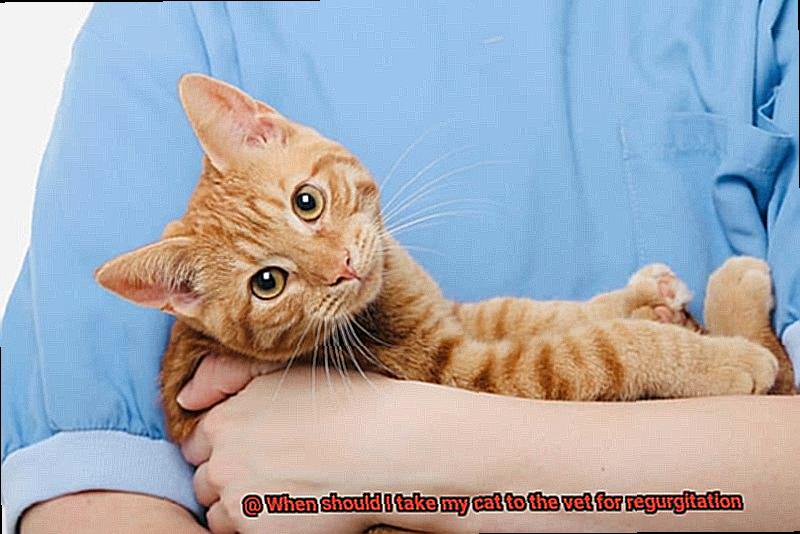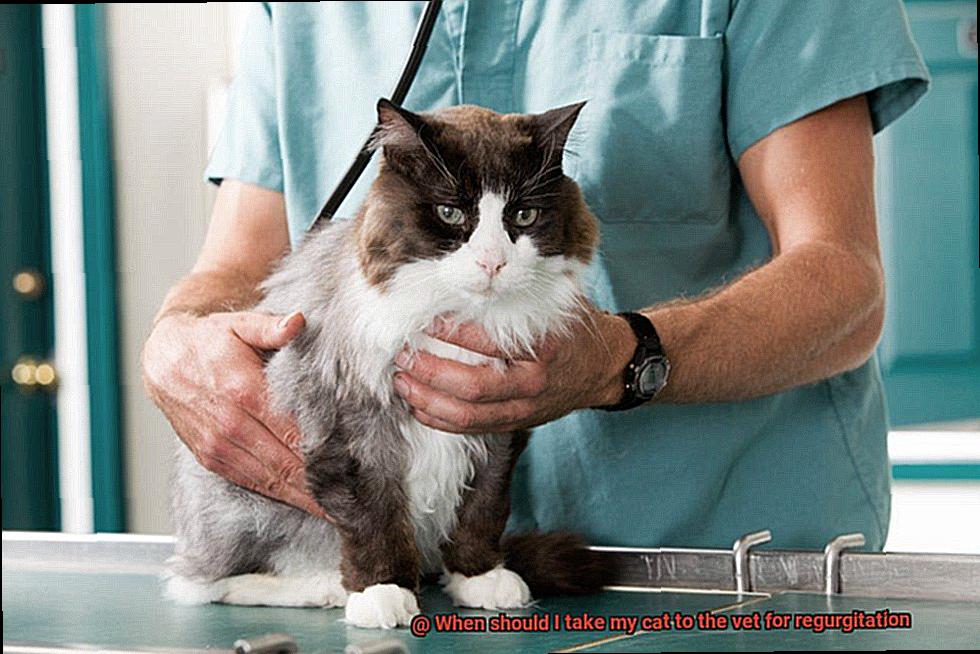Cat owners, have you ever witnessed your beloved feline friend regurgitating? It’s not the most delightful sight, but it’s crucial to pay attention to your cat’s behavior and know when it’s time to make a trip to the vet. While occasional regurgitation is common, persistent regurgitation could be indicative of a severe health issue.
Regurgitation happens when food or liquid is brought up from the cat’s mouth or esophagus without any forceful contractions from the stomach. It is different from vomiting, which involves forceful contractions of the stomach muscles. Cats usually regurgitate due to hairballs, eating too quickly, or swallowing foreign objects. However, there are more serious causes such as gastrointestinal issues, esophagus disorders, and even cancer.
So when should you take your cat to the vet for regurgitation? That’s precisely what we’ll be discussing in this blog post. Don’t ignore any changes in your cat’s behavior and seek medical attention as soon as possible. We’ll be covering the signs that indicate a visit to the vet is necessary, what you can expect during your appointment with the veterinarian, and potential treatments available for your feline companion. Trust us; taking care of your furry friend now will go a long way towards ensuring their good health in the future.
What is Regurgitation in Cats?
This condition is called regurgitation and can be caused by a variety of factors.
Unlike vomiting, which involves an active process of expelling stomach contents, regurgitation is a passive process where undigested food or liquid is brought up from the esophagus without any effort. Frequent or persistent regurgitation can indicate an underlying health problem in your cat.
Some potential causes of regurgitation in cats include gastrointestinal disorders, esophageal problems, and neurological conditions. Gastrointestinal disorders like inflammatory bowel disease, gastrointestinal foreign bodies, and gastroesophageal reflux disease can cause regurgitation. Esophageal problems such as megaesophagus, which makes it difficult for food to move to the stomach, can also cause regurgitation. Neurological conditions such as myasthenia gravis can affect the muscles responsible for swallowing and lead to regurgitation.
Certain factors may increase your cat’s risk of developing regurgitation. Eating too quickly, eating large meals, eating too soon after exercise, and eating food that is difficult to digest are some examples.
If your cat experiences frequent or persistent regurgitation, it is important to schedule a visit with your veterinarian. Your vet will perform a physical examination and may recommend additional tests such as blood work, x-rays, or an endoscopy to identify the underlying cause of the regurgitation.

In some cases, changes to your cat’s diet or feeding habits may be enough to manage the problem. For instance, feeding smaller, more frequent meals or using a specially designed feeding bowl that slows down eating can help reduce the risk of regurgitation. However, in other cases, medication or surgery may be necessary to treat the underlying condition causing the regurgitation.
Causes of Regurgitation in Cats
So, when you notice them regurgitating their food or water frequently, it’s essential to understand what might be causing this issue. Regurgitation happens when undigested food or liquid is brought up from the esophagus without any effort, unlike vomiting that involves forceful contractions of the stomach muscles. In this article, we’ll explore the various causes of regurgitation in cats and why it’s crucial to seek veterinary attention if you notice any signs of regurgitation.
Esophageal problems are one of the significant causes of regurgitation in cats. Cats with strictures, motility disorders, or foreign bodies in their esophagus can experience difficulty swallowing leading to regurgitation. Gastrointestinal diseases such as inflammatory bowel disease (IBD) or gastroesophageal reflux disease (GERD) can also cause inflammation and irritation of the digestive tract, leading to regurgitation.
Additionally, neurological issues such as brainstem lesions or disorders that affect the nerves controlling swallowing can also cause regurgitation. Some cats may be born with congenital abnormalities that affect their ability to swallow properly, leading to regurgitation. Megaesophagus is another condition where the esophagus enlarges and loses its ability to contract properly leading to regurgitation.
If your cat is experiencing regurgitation, it’s vital to take them to the vet immediately. Frequent or persistent regurgitation could be a symptom of an underlying health issue that requires immediate attention. The vet will diagnose and determine the underlying cause of the regurgitation and provide appropriate treatment.
Risk Factors for Regurgitation in Cats
That’s why it’s essential to be aware of the risk factors for regurgitation in cats. This sign may indicate an underlying health condition that requires immediate attention from a veterinarian.
Regurgitation can affect cats of any age, but older felines are more susceptible due to weakened esophageal contractions and decreased muscle tone. If your cat is experiencing frequent regurgitation episodes, don’t wait to seek veterinary care. The earlier the diagnosis and treatment, the better the prognosis.
Certain breeds of cats, such as Siamese and Oriental breeds, have a long and narrow esophagus, making them more prone to regurgitation. Additionally, overweight or obese cats are at an increased risk due to the pressure on their stomach and esophagus. If your cat falls under these categories, pay extra attention to their behavior and take them to the vet if you notice any signs of regurgitation.

Medications can also increase the risk of regurgitation in cats. Some anesthesia drugs, muscle relaxants, and certain pain medications can cause relaxation of the esophageal sphincter or slow down gastrointestinal motility.
Cats with a history of gastrointestinal problems such as inflammatory bowel disease, gastroesophageal reflux disease, or megaesophagus are also at a higher risk of regurgitation. Keep an eye out for any signs of regurgitation in your cat and seek professional help when needed.
When to See the Vet for Regurgitation in Cats
One warning sign that shouldn’t be overlooked is regurgitation. Although it may seem like a minor issue, regurgitation can actually be an indication of an underlying health problem that demands veterinary attention.

Regurgitation differs from vomiting in that it’s a passive expulsion of food rather than an active process. If you notice your cat regurgitating frequently or appearing uncomfortable during the process, it’s essential to seek veterinary attention without delay.
One of the most common causes of regurgitation in cats is a problem with their esophagus. An obstruction or stricture in the esophagus can prevent food from passing through normally, resulting in regurgitation. Additionally, if the muscles in the esophagus are not functioning properly, food may not be propelled down into the stomach as it should.
Another possible cause of regurgitation in cats is a problem with their stomach or intestines. A blockage or other issue that prevents food from moving through the digestive tract properly can result in regurgitation. Inflammation or irritation in the stomach or intestines can also cause your cat to regurgitate.
While some cats may occasionally regurgitate without any underlying health issues, if your cat is frequently regurgitating or appears to be uncomfortable during the process, it’s vital to seek veterinary attention. Your veterinarian will conduct a thorough examination to determine whether there’s an underlying health condition that requires treatment.
Diagnosing the Cause of Regurgitation in Cats

That’s why it’s essential to recognize and address any signs of discomfort or illness, including regurgitation. In this article, we’ll dive into the various causes of regurgitation in cats and why it’s essential to seek veterinary care if you notice any symptoms.
One of the most common culprits of regurgitation in cats is esophageal disorders. These disorders may include conditions like megaesophagus, which enlarges and weakens the esophagus, making it challenging for food and water to pass through appropriately. Narrowing of the esophagus, known as strictures, can also make swallowing difficult for cats.
Another potential cause of regurgitation is gastrointestinal obstructions. When foreign objects or materials block or lodge in the digestive system, food cannot pass through normally, leading to regurgitation. Obstructions can lead to severe complications if left untreated, so it’s crucial to take your cat to the vet immediately if you suspect an obstruction.
Certain medications can also trigger regurgitation in cats. Antibiotics and pain medications that impact the digestive system may cause regurgitation. If your cat experiences regurgitation after taking medication, speak with your vet about potential side effects and alternative treatment options.
Treating the Cause of Regurgitation in Cats
So, if your cat is experiencing frequent regurgitation episodes, don’t take this symptom lightly. This could be an indication of a serious health issue, such as esophageal disorders or gastrointestinal obstructions. To get your cat back on the road to wellness, seek veterinary care immediately.
At the vet’s office, your cat will undergo a thorough physical examination, including diagnostic tests like blood tests and urinalysis, to determine the underlying cause of regurgitation. A customized treatment plan will then be developed based on the results.
If foreign body obstruction is detected as the root cause of regurgitation, surgery may be necessary to remove it. Alternatively, if your cat is diagnosed with gastrointestinal disorders like inflammatory bowel disease (IBD), medications such as corticosteroids may be prescribed to manage the condition.
Feeding management can also be an effective way to treat regurgitation. Your veterinarian may suggest changing your cat’s diet or feeding smaller meals more frequently. Elevating the feeding dish can also help prevent food from coming back up. Adequate hydration is essential too, so make sure that your cat has access to clean water at all times.
MVndPT9seFE” >
Conclusion
To sum it up, regurgitation is not something to be taken lightly when it comes to our feline friends. While it may happen occasionally, persistent regurgitation could be an indication of a more serious underlying health issue. It’s essential to understand the potential causes and risk factors associated with regurgitation in cats.
Esophageal disorders, gastrointestinal obstructions, neurological conditions, and medication side effects are just a few of the possible culprits behind regurgitation in cats. Factors such as breed, age, weight, and medical history can also play a role in their susceptibility to this condition.
If you notice your cat experiencing frequent or persistent regurgitation episodes, don’t hesitate to seek veterinary care. A thorough physical exam and diagnostic tests like blood work or x-rays may be necessary to identify the root cause. Treatment options will vary depending on what’s causing the issue but could include changes to feeding habits or medication.
Remember that ignoring signs of regurgitation could lead to severe complications for your beloved pet down the line. As responsible cat owners, we must keep an eye on our furry companions’ behavior and seek medical attention if needed.

